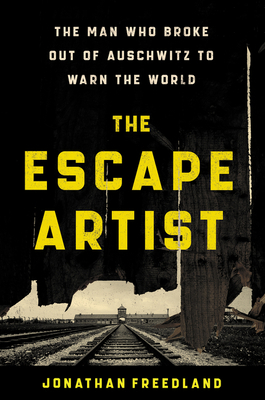
From out of nowhere" a sound happens. "Someone sings a pitch" and "once someone starts, everyone wants to be a part of it." The sound of the national anthem resonates and "It's completely organic."
"We are not a nation of soloists, but a chorus of shared values that when joined together resonate like nothing the world has ever heard," says Steve Hartman in his conclusion to this feel-good story about students who "spontaneously" erupt in an elegiac rendition of the national anthem . . . and become part of a tradition of young people who do this every year in this Kentucky hotel.
I would agree, with a caveat: somebody starts the hum. One person decides to be first, and then others join.
I just finished reading an astounding, devastating, inspiring story of the first Jew to escape Auschwitz—a teenager who was driven to action in order to spread the truth of the industrial murder of babies, old people, men, women and children who had the misfortune by their ethnic heritage to be deemed less than human and a scourge to Aryan society.
The Escape Artist: The Man Who Broke Out of Auschwitz to Warn the World (Harper Collins, October 2022) by Jonathan Freeland reads like a page-turning novel, at times so brutal that you feel it viscerally. Its subject, Walter Rosenberg, was sixteen years old when he was captured and deported, and his unlikely survival in Auschwitz was due to two qualities: his conviction that if people knew that the Nazis' lies about this being a mere resettlement of people were a public relations act to conceal mass murder, torture, and cruelty as a sport, they would do something; and his paranoid personality that kept him skeptical and therefore safe from rookie mistakes.
Rosenberg and another inmate, Fred Wetzler, do the impossible by careful observation and calculation: where others see only that the Nazis are an efficient machine guarding the prison on two concentric fronts, Rosenberg and Wetzler, students of observation, realize that it is the Nazis' predictable actions that produce a loophole for escape. (Read the book to learn what this is.) Rosenberg learns from others in the camp the basics of what not to do. (Again, read the book.) He is meticulous and patient, but also desperate because he is privy to the Nazi plan to shortly deport hundreds of thousands of Hungarian Jews. Rosenberg and Wetzler want to get the news to them so they will rise up en masse and refuse to board the deportation trains.
They escape. They report to resistance forces who write a report. Walter Rosenberg changes his name on forged papers to Rudolf Vrba (he will keep that name for the rest of his life. Wetzler briefly changes his name, then resumes being Wetzler), and the two young men wait for the world to rally.
At every juncture, their copious written report met lethargy, procrastination, convenient incredulity allowing inaction, or ineffective action from everyone from Winston Churchill to Franklin Roosevelt to the pope. The critical information, which Walter and Fred had intended to save the soon-to-be murdered Hungarian Jews was not only kept from them because of secret, futile negotiations between Hungarian Jewish leadership and the Nazis, but they were delivered willful misinformation—bogus "Everything's fine" postcards written by their relatives in Auschwitz at the direction of their murderers moments before they were shoved into the gas chambers.
Does any of this resonate with misinformation campaigns today? With the difficulty of battling big lies with truth? With worldwide campaigns to create inaction or self-sabotaging actions among people who accept carefully crafted public relations, or, worse, only care about protecting their own positions?
Rudi Vrba, Wetzler, and two other Jews who escaped after the first two, were more frustrated than you probably are at this point of my recount, so what did they do? They decided to disseminate their report themselves.
Author Jonathan Freedland wrote this story because Vrba's life deserves the same attention as other Holocaust celebrities. Vrba probably had zero interest in this kind of notoriety cum power. His mission was always to save lives. He rallied his strengths for this mission: a keen ability to observe and will everything he saw to memory. He was not a genius, but by sheer conviction and dedication, he developed a kind of savant memory for details. He believed change was worth any risk.
And change did come—much slower than Vrba and Wetzler wanted—and it came because the Vrba-Wetzler Report finally reached a few people who would act. And pressure began to build against the Hungarian deportations. And a Hungarian government who really didn't mind the deportations, acceded to the pressure. And gradually more people with none of the ethics and mission of Vrba and Wetzler began to act. They acted as a herd. And two young Slovakian Jews saved 200,000 Hungarians who would never know about them.
We are herd animals and apparently most of us are not directed by an inner compass. Nevertheless, Vrba's story shows that a few people with relentless will to do the right thing—and the requisite craziness to carry out the mission—can choose to be the one to start a herd action, and by this choice, actually change the direction of a world herd.
Will you commit to "being the one"—the one to say "That's wrong" out loud when you see something cruel; the one to start the applause when something worthy of praise happens; the one to run to help or hug when you witness the need; the one to sound the first pitch and get the whole damned choir singing?